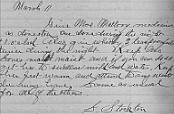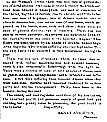Sarah Stockton was born on a farm in Tippecanoe County in 1842. After running a boarding house with her sister for many years, she embarked on a medical career, receiving a medical degree from the esteemed Woman's Medical College of Pennsylvania in 1882. While at the Woman's Medical College, Sarah devoted much of her time to writing a doctoral thesis on the history of insanity and the treatment of mental illness.
An abiding interest in the study of mental illness brought Dr. Stockton to Central State Hospital (CSH) in December 1883. Primarily, she served as a general practitioner on the women's wards, treating female patients for a wide range of physical and mental ailments. According to Superintendent William Fletcher, however, her job was to treat female patients suffering from reproductive ailments peculiar to their sex. Many a physician, including Fletcher, thought that reproductive ailments could cause or exaggerate mental illness in women and that women physicians were uniquely qualified to treat gynecological disorders.
Dr. Stockton, who was as fully immersed in Victorian culture as her male counterparts, seemed to agree with Dr. Fletcher's assertions. Possibly, she agreed with Fletcher to keep her job, but given her close personal relationship with Fletcher and the general tenor of all her writing, it appears that she, too, subscribed to the theory that gynecological ailments could cause insanity. Self-preservation may have compelled Dr. Stockton to support the argument that only women should perform pelvic examinations on women, but Stockton probably agreed with this argument on a philosophical level as well.

Medical Treatments Prescribed by Dr. Stockton (75.4 kb)
According to her reports, Stockton's primary job was to provide "treatment for the relief of derangements and diseases of the pelvic organs by which both the mental and physical health of insane women might be benefitted." Stockton, however, was cautious not to attribute all mental illness in women to reproductive disorders. Yet, she still believed that this class of disorders could cause insanity. She noted in a 1885 report that "irregularities of menstruation are common among insane women, but I do not believe that in every instance it takes part in causing insanity."

Medical Treatments Prescribed by Dr. Stockton (29.6 kb)
While Dr. Stockton treated women with gynecological troubles, she also spent much of her time treating common afflictions like colds, sore throats, and upset stomachs. To treat these ailments, Dr. Stockton performed medical procedures ranging from administering drugs to surgery.

In 1888, Dr. Stockton left Central State Hospital to work at Dr. Fletcher's new sanatorium in Indianapolis. Later in 1891, the managers of the Indiana Reform School for Girls and Woman's Prison appointed Dr. Stockton as the institution's physician. Sarah, alone, administered medical treatment, including surgical treatment, to the entire inmate population.
In 1899, Dr. Stockton once again returned to Central State Hospital. This time she stayed until her health declined in 1923. In addition to her hospital duties, Stockton served on the powerful Board of State Charities from 1904 to 1907. After forty years of public service, Dr. Stockon died from a severe heart attack on March 13, 1924.
Looking back on her career, Dr. Stockton was an amazing woman. She never allowed sexism or financial hardship to stand in her way. As a public servant, Sarah lived on a meager salary, but her commitment to serving Indiana's underprivileged gave her the fortitude to endure hard, long hours at Central State Hospital. Late in her career, she may have been accused by some co-workers as being a "millstone" and a malingerer, but it was her old age and poor health that encouraged these remarks. For most of her career, Dr. Sarah Stockton had served patients at Central State Hospital with great heroism, dedication, and empathy.
